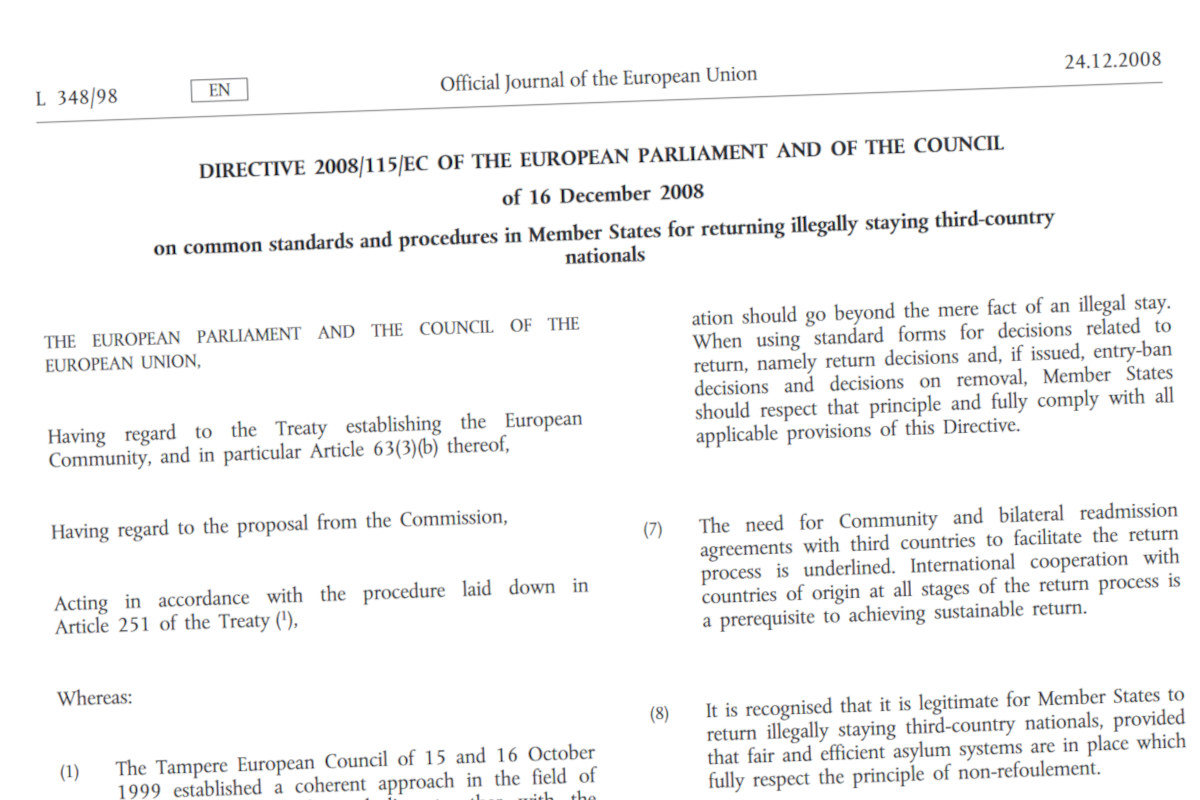Deportations: when “assertiveness” and “effectiveness” entail violence and abuse
Topic
Country/Region
25 November 2024
Increasing the number of deportations from the EU is a longstanding policy goal. In 2025 a new deportation law will likely be proposed, replacing the 2008 Returns Directive. Documents published alongside this bulletin offer some insights into what may be included in that proposal. The implications for individuals facing deportation are likely to be damaging: fewer legal safeguards, more obligations and increased coercion, and new ways to remove people to countries deemed unsafe.
Support our work: become a Friend of Statewatch from as little as £1/€1 per month.

More deportations
Improving EU cooperation and coordination on deportations has been a policy objective since the 1990s. The ultimate goal is to increase the number of people deported from the EU. Over the last five years, various changes have been introduced with this aim in mind.
These include new powers for Frontex; the establishment of the post of ‘Return Coordinator’ in the European Commission; and monitoring of non-EU states’ level of cooperation with deportations, with a lack of compliance liable to spark punitive “visa sanctions”. MOCADEM regularly examines non-EU states’ deportation policies.
More recently, the issue of “return hubs” – which might better be termed deportation camps – has been put on the agenda. These proposals, currently the topic of much debate within the Brussels bubble, come alongside a range of others, revealed in documents published with this bulletin. Some of these may well find their way into a fresh proposal for a law to replace the 2008 Returns Directive.
While a proposal to revise the Returns Directive was published by the European Commission in 2018, negotiations have stalled, and the Commission and the Council are now committed to a new text. Commission President, Ursula von der Leyen, has said this proposal will be “one of the immediate tasks for the Commissioner for Internal Affairs and Migration.”
Despite years of failure on its own terms, the EU looks set to make its deportation policies even harsher, causing more harm to a greater number of people. However, policy documents make no explicit mention of negative effects for individuals. Instead, documents circulated within the Council in recent months have called for “steps towards a well-functioning return system” (13 July) based on “a more assertive returns policy” (9 September) that can increase “effectiveness” (13 September).
Deportations: “a top priority”
The Hungarian Presidency took up its role on 1 July, and just over two weeks later a document for a meeting of the Council’s Integration, Migration and Expulsion (IMEX) working party looked at “steps towards a well-functioning return system.” The Presidency’s aim is for discussions within IMEX is to examine topics from “from a more operational perspective.”
The 18 July document highlights that deportation (“return”) is “a top priority and part of the Schengen cycles, including the current one (2024-2025).” The “Schengen cycle” is the process for evaluating member state compliance with laws and policies on the Schengen area.
The document also emphasises the need for “the appropriate synergy” between an “obligation to cooperate with the authorities and the guarantee of the fundamental rights of the persons.” Without this, “enforcement is jeopardised,” and there may be “an impact on our external dimension ambitions and on cooperation with third countries.”
The document also refers to the recently-adopted Regulation on a return border procedure. This provides new, swifter means for deporting people who have been refused entry at the borders. It allows the quicker deportation of people deemed a security threat, an issue that has come up at multiple Council working party meetings in recent months.
The Presidency’s July document notes that the Council’s position on the 2018 proposal for a revised Returns Directive would have made it easier to detain individuals deemed a security threat, and to deny them a period for voluntary departure. More may be to come. There is a reference to “the possibility of other derogations that could contribute to a more effective return of such third country nationals.”
The document also highlights a new legal obligation to enter expulsion orders in the EU-wide Schengen Information System database. There is also the possibility of placing a “security flag” on alerts involving people deemed to pose “a threat to public policy, public security or national security.”
It is argued that appeals against return decisions should only have a suspensive effect “when there is a risk that the third-country national concerned would be exposed to a real risk of ill-treatment in case of return.” Without such a risk, the document says, the suspensive effect should not apply – a move that would increase the likelihood of returning someone to danger.
“Out-of-box” solutions
In the document from 9 September, the Hungarian Council Presidency sets forth a number of other proposals. Initiatives that are underway, such as the reform of the Common European Asylum System, are deemed unable “to reduce the overall burden on Member States.” Thus, innovative “out-of-box” solutions must be found.
This should include progress on the recast Returns Directive, which has been stalled since 2020 and is likely to be the subject of a fresh proposal next year. The recast has been criticised as a “lock ‘em up” reform due to an increased number of grounds for detention preceding deportations. It is unlikely that the new proposal will take a softer approach. It is worth noting that a paper from March asked member state delegations for their views on whether EU legislation “should establish minimal detention capacities at EU and national levels?”
The return rate (the number of expulsion orders issued versus the number of removals carried out) is cited to demonstrate the need for “out-of-box” solutions. In 2023, 484,160 expulsion orders were issued, while 91,465 were deported, a rate of 18.9%. Whilst acknowledging that the “gap” is narrowing, the Presidency says “there is still significant room for further improvement.”
The violence and abuse that come with the deportation system go unmentioned, despite well-documented human rights violations, misuse of sedatives, deaths in detention centres and discriminatory policing to apprehend foreign nationals for removal. These are ignored in favour of instrumental and speculative claims, such as “Member States continue to face significant challenges related to asylum applications lodged solely to obstruct returns,” and “a large number of migrants arriving illegally is unlikely to be eligible and meet the conditions for receiving international protection in the EU.”
The document calls for the EU’s externalisation “toolbox” to be extended by complementing it with “readmission conditionality under the Generalised Scheme of Preferences (GSP) Regulation.” This is an attempt to use trade policy to impose EU migration priorities. There is also a call to intensify the “Team Europe” approach and “partnerships” with non-EU states. This appears to be an invitation to step up initiatives that have been criticised as blackmail, whilst activating further incentives for third countries.
Member states must “significantly improve return rates”
Similar issues come up again in a Presidency paper circulated on 13 September for a meeting of the Strategic Committee on Immigration, Frontiers and Asylum (SCIFA). The document laments the “stalling” of the legislative process on the recast Return Directive, but proposes a number of elements for the “future legal framework.”
The paper cites an increase in the return rate from 2022 to 2023 (from 15.5% to 18.9%), with partial figures for 2024 indicating a further increase. The document nevertheless reasserts “the need of Member States to significantly improve return rates.” The top nationalities of recipients of expulsion orders are Algeria, Morocco, Turkey, Afghanistan, Syria and Georgia, each of which poses its own protection and safeguarding issues.
The document refers to some of the same “innovative” proposals brought up in the Presidency’s 9 September paper, such as extraterritorial deportation camps, the removal of people deemed a security threat, and ensuring that appeals against removal decisions do not automatically have a suspensive effect.
It goes on to refer to discussions in COREPER (the Committee of Permanent Representatives) in September, that resulted in “broad agreement” on updating the legislative framework and attempting to remove operational obstacles.
These include non-cooperation by non-EU nationals facing deportation, and ways to deal with asylum applications deemed to be mere attempts to obstruct removal. Some member states support the option of empowering Frontex to support returns “from third countries to third countries.” This idea was included in the proposal for the 2019 Frontex Regulation but removed at the behest of MEPs.
The document states that “innovative solutions” for increasing deportations must be “legally, operationally and diplomatically sound.” While this requires legal compliance and coherence, it does not guarantee that existing legal safeguards will not be removed or watered down.
For example, the document describes the non-refoulement principle as “indispensable” and says it should be “taken into account and examined during the whole return procedure.” Yet it goes on to say that it is a “common challenge” that many destination countries for deportations are classified as unsafe, making removals impossible.
Efforts to overcome this include finding individual solutions, such as “encouraging and supporting voluntary returns,” considering key aspects of “sustainable return,” and gaining support from international organisations, such as UNHCR. The possibility of cooperation with “unrecognised authorities of certain third countries” is also mentioned, though this has “broader political implications” that are not further specified.
The “challenge” posed by the non-refoulement principle is raised as a problem specifically relating to the deportation of individuals deemed to pose a security threat. This is evidently a high-priority issue for EU member states. The question is whether the purported urgency of removing “threats” to the EU will be used as a wedge to undermine the principle more broadly.
Following the blueprint
The Hungarian Presidency is, unsurprisingly, following the returns policy blueprint it inherited from its predecessor, with a particular focus on expanding detention, introducing extraterritorial deportation camps, and watering down safeguards, likely with a view to making the Commission’s forthcoming proposal for a new deportation law even harsher for individuals. The documents also feature a tendency to treat people from predominantly Muslim countries (Syria and Afghanistan are mentioned specifically) as inherent security and/or public order threats, and indicate a desire to water down protections against non-refoulement and reduce scrutiny of asylum applications and appeals, based on presumptions about their supposed instrumental purpose.
Our work is only possible with your support.
Become a Friend of Statewatch from as little as £1/€1 per month.
Spotted an error? If you've spotted a problem with this page, just click once to let us know.
